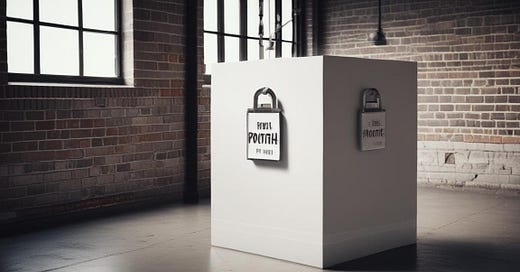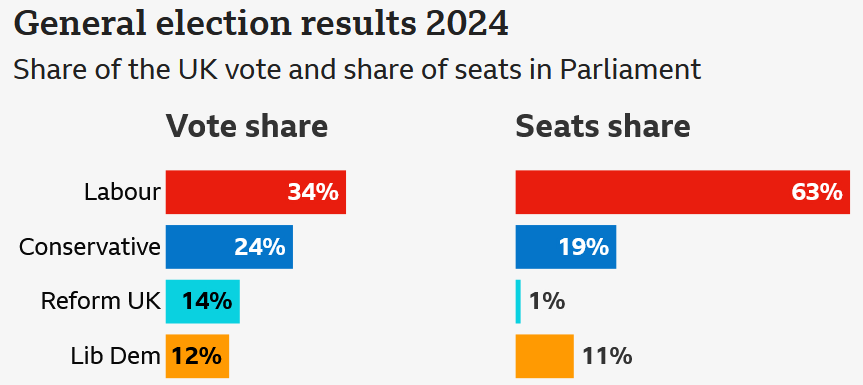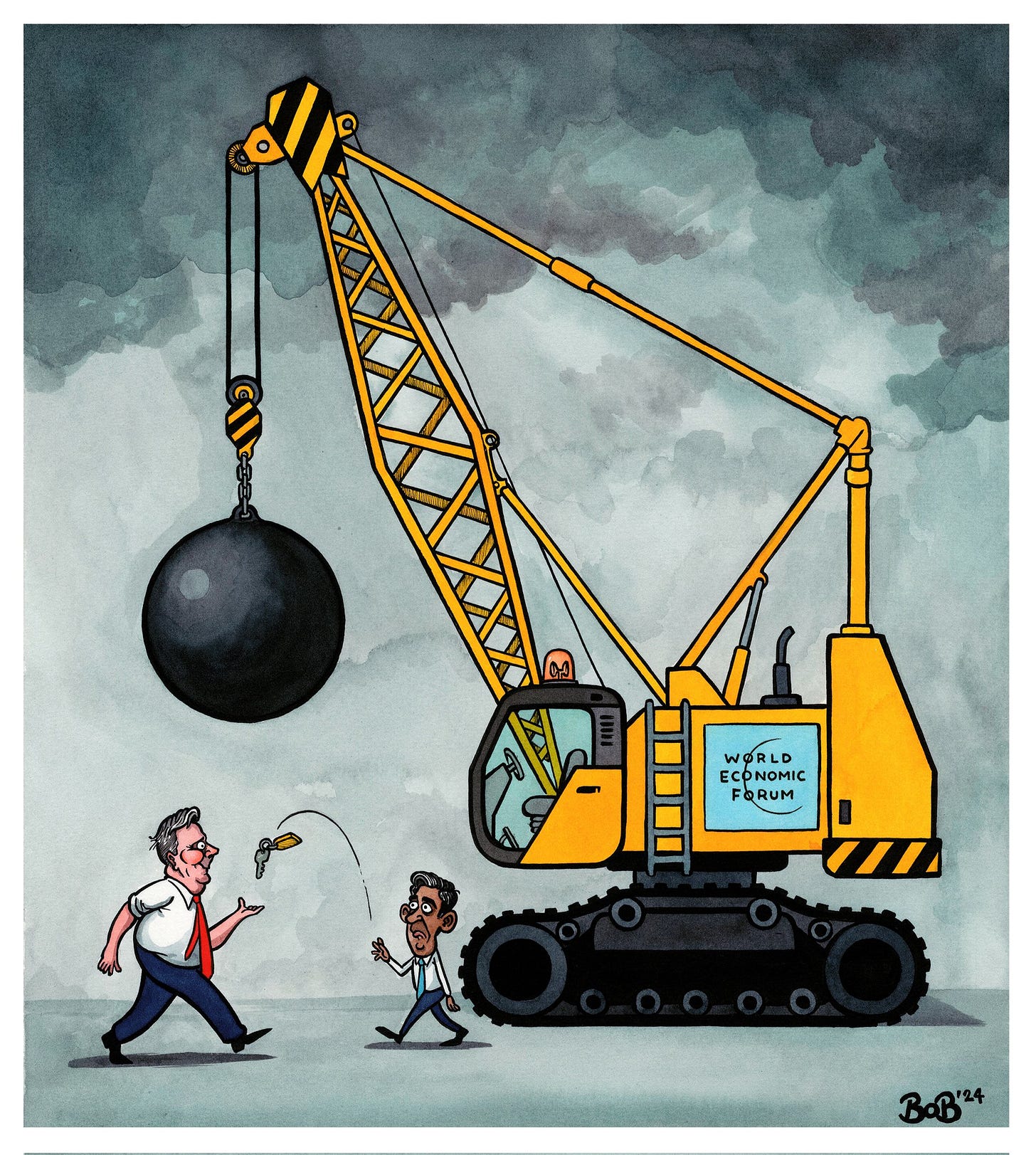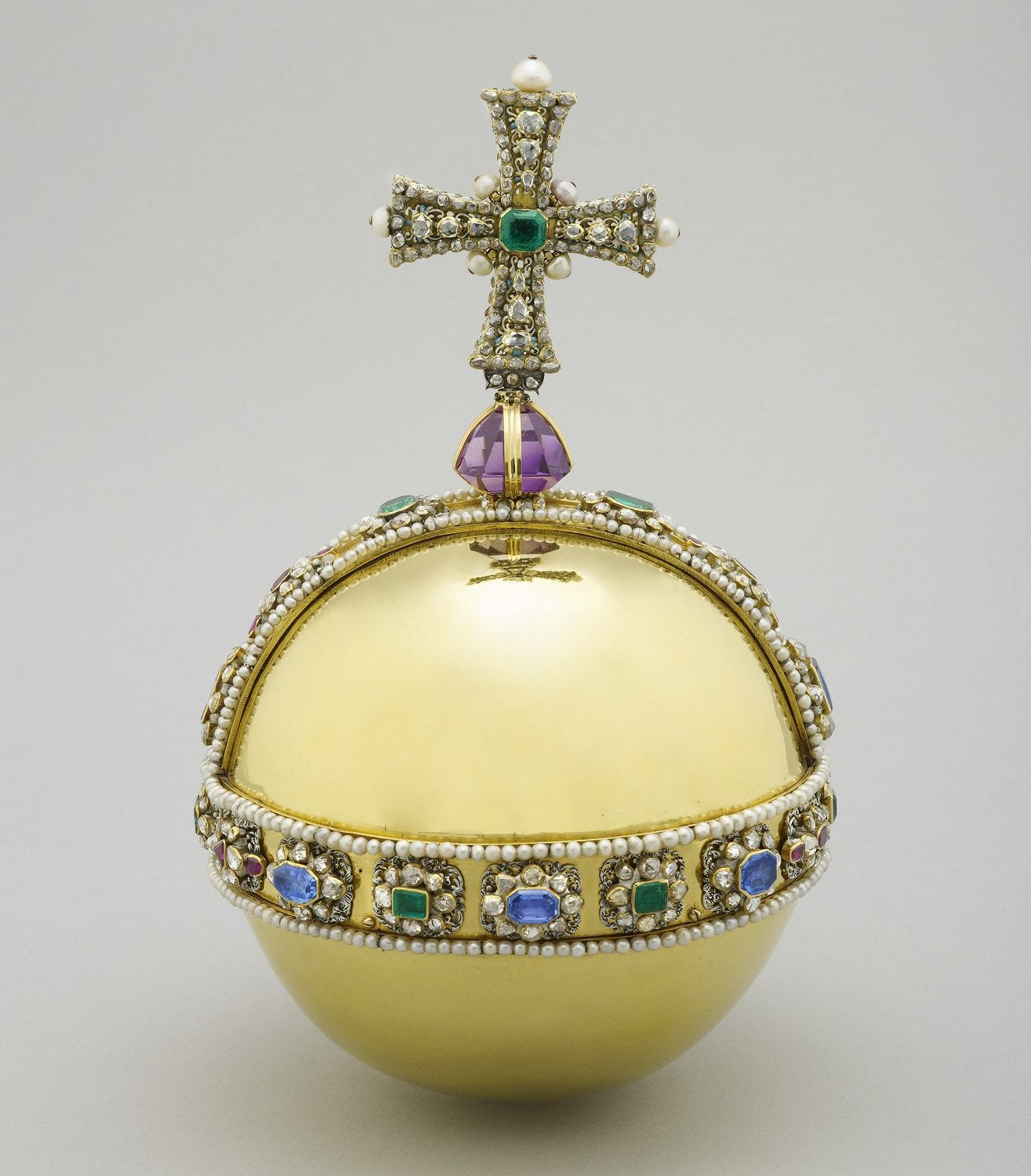Democracy itself needs reform
We don't need proportional representation; we need to reboot the concept of democracy itself
There’s been a lot of talk recently about how democracy is in decay. A lot of people have recognised that democracy isn’t working as it should. The election last week demonstrated the scale of the problem - this UnHerd interview is a fascinating dive into the statistics:
It seems that a big reason for the Labour landslide was to do with conservative voters simply not showing up, or voting for Reform instead. Freddie Sayers noted on X after the election that the total number of votes for Labour was less than the number that Jeremy Corbyn won back in 2017. The statistics about Reform in particular make for interesting viewing: Reform won 14% of the votes, but only 1% of the seats; by contrast, the Lib Dems won 12% of the votes and 11% of the seats:
Almost everyone can see the problem,and several political parties have said they would fix the issue by changing the electoral system to Proportional Representation. This would mean the number of seats a party won in parliament would be proportional to the share of votes that they won. This would mean, for example, that Reform wouldn’t be in the situation of having more votes than the Lib Dems but far fewer seats.
Aside: personally, I don’t like Proportional Representation. In particular, I dislike the fact that it breaks the link between voting and your local MP. I think there are better systems such as the Alternative Vote system - which was rejected in the 2011 Referendum - or the Single Transferable Vote system.
Electoral reform is certainly something worthwhile we need to consider. However, it seems to me that we need much more than electoral reform. It might be a part of the solution, but there are bigger reforms which need to happen - and few people are talking about those. What I’m going to do here is briefly look at democracy and what it is trying to achieve, before moving on to look at the problems we are facing with democracy in this country.
Why democracy?
Let’s start with the obvious question of why we have democracy in the first place. Lord Acton once famously said: “Power corrupts. Absolute power corrupts absolutely.” Democracy is an attempt to try and prevent any one government or individual from having absolute power. The word itself derives from two Greek words, demos - people - and kratos - power. The people should be able to exercise power over their rulers, so that the rulers are kept accountable to the people.
I think Tony Benn’s five essential questions of democracy are an excellent summary:
“What power have you got?”
“Where did you get it from?”
“In whose interests do you use it?”
“To whom are you accountable?”
“How do we get rid of you?”
Democracy comes from the Christian idea that rulers should not lord it over their subjects, but be servants. That’s why we have ‘ministers’ - which is another word for servant. According to the Bible, true leadership is servant leadership - following Jesus’ example (Mark 10:45).
Something which it is important to point out is that democracy itself is not a Biblical word. It comes from a Christian worldview, but the concept itself is not found in the Bible. This is because servant leadership does not require democratic accountability. Take the late Queen Elizabeth for example: she was not elected, she didn’t have to worry about losing her seat at the next election - yet she served the country all her life.
As we’ve seen, democracy is a profound idea which goes far beyond any particular electoral system implemented. Let’s move on to think about some of the issues with democracy as outlined this way.
Servant leadership
In order for democracy to function, the rulers of a country ought to be scared of the electorate. Not scared in the Yes Minister sense (Jim Hacker is continually scared of doing anything which might be seen as unpopular, even if it is the right thing to do - Sir Humphrey simply needs to call a decision ‘courageous’ in order to cause Hacker to reconsider). But scared in a healthy sense of being held accountable. If you know your accounts are going to be independently audited at the end of the year, it should discourage you from committing fraud. Similarly with government.
Is that the way things are at the moment? In my opinion, we’re not even close. I think, rather than democratic accountability, governments take an election win as a mandate to do whatever they had decided to do beforehand. Regardless of whether those plans were in the manifesto, or supported by the electorate (or even opposed by a majority in the electorate). For example, how many people who voted for Brexit (and the Tories in 2019) were happy with the Brexit that was delivered? How many people are happy about mass migration, as well as the small boats crossing the channel? How many people wanted the Iraq war, or wanted the UK to support Ukraine in the way it has?
This attitude can be seen in last week’s election. Rather than Labour reflecting on the fact that it was a very ‘hollow’ victory - as discussed in the introduction - they seem to be rejoicing in the fact that they received a huge majority. A government that was truly democratic would perhaps be rather more circumspect and reflective about the agenda it wanted to implement, knowing that it was on shaky ground.
I believe a big part of the problem is that power has now shifted away from governments to third-party organisations such as the UN, the WEF, the WHO, and the like. (Don’t forget that our new Prime Minister, Keir Starmer, said that he preferred Davos to Westminster in an interview.) This is why governments are looking increasingly homogenous. Neil Oliver once likened voters in modern Western democracies to passengers on a train who are allowed to vote occasionally for which colour the engine is painted. I think Bob summed it up brilliantly in his most recent cartoon:
Part of the problem is that governments of any colour do not see themselves as accountable to the people, so much as accountable to their globalist overlords.
If you want proof of this, check out this recent article on the Daily Sceptic, looking at the role of a shadowy body called the “Joint Biosecurity Centre” in the UK’s covid response. It should be clear to any independent observer that the government elected by the people is a different group to those pulling the strings.
An informed electorate
I’m always struck whenever I spend any time in the mainstream media just how different the world is. It’s like the mainstream media exist in a parallel universe to reality. This is reflected in my conversations with friends and family members, who still think that what the mainstream media say is a fair and accurate representation of the truth. We simply do not see things in the same way - we live in worlds which are irreconcilable.
How can the electorate be expected to vote in an informed way when all the information they are given comes from a media effectively controlled by the government?
Take covid as an example. Most of the opinion polls through covid showed that a majority of people were in favour of more lockdown restrictions. You could say that lockdowns were a ‘democratic’ success story. But consider that: (1) government-regulated schools do not teach the value of freedom and ethics; (2) governments spent billions on advertising in the mainstream media; (3) most mainstream media did not question the lockdown narrative (not surprising given the second point - why bite the hand that feeds you?); (4) the government were involved in suppressing social media content and even spying on individuals. These are just a few of the ways that governments manipulated the public.
If the press cannot be relied upon to print the truth, then what value are opinions based on information provided in the press? Democracy requires a free press, a press which is free from government interference. When it comes to the mainstream media, that is one thing we do not have at the moment - although I personally am glad of modern media platforms such as Triggernometry, UnHerd and many others who seek the truth in ways long since abandoned by the mainstream media.
A Christian government
One of the things which I as a Christian want to vote for is a Christian government. I do not simply want to vote for the party which has the best policies, but a party which is explicitly founded on Christian principles. It’s become abundantly clear to me recently that the choice we have is between Christ or the Abyss. There is no in between.
I was talking about this with my wife the other day, when it suddenly struck me that - in a sense - I can’t vote for this because we already have it. In theory, at least: we have a monarch who is constitutionally bound to uphold the Christian religion. King Charles made a solemn promise at his coronation:
Will you to the utmost of your power maintain the Laws of God and the true profession of the Gospel? Will you to the utmost of your power maintain in the United Kingdom the Protestant Reformed Religion established by law? Will you maintain and preserve inviolably the settlement of the Church of England, and the doctrine, worship, discipline, and government thereof, as by law established in England?
He was also given an orb which has a cross on the top, to represent the fact that he rules only under the cross. (The coronation service is shot through with Christian symbolism.)
Someone might argue: “Phill, you can’t vote for a Christian government - because you already have one. The head of state is a Christian, we are constitutionally Christian. What more could you want?”
And this gets to the heart of the problem with democracy. At the moment we have something which looks like a democracy on the outside, and yet is clearly not functioning well by any standard of democracy. In the same way, we have a country, which is constitutionally Christian, yet which is doing its darndest to drive Christianity into the dust and has rejected many distinctive Christian doctrines such as the sanctity of life and marriage.
This why I think the problems with democracy will not be solved by electoral reform. The problems go much deeper than that. We need a fundamental commitment to the Christian principles of democracy, so that it does not become simply a box-ticking exercise to rubber-stamp whatever course the government had planned, but is about serving the people. A constitutionally Christian monarchy needs to be more than a box-ticking exercise but a true commitment to leading the country in a Christian way.
Electoral reform may be a worthwhile endeavour, but we need to recommit ourselves as a nation to the Christianity which gave birth to our democracy in the first place. Only then will we have the change that we need.








PR does not necessarily break the relationship between representative and represented. We have had the Additional Member System (AMS) in Wales 9and in Scotland) for Senedd and Holyrood elections since 1999. and you are fortunate enough to have a responsive MP. if you live in a safe Labour seat, like I do, then they don't reply to letters/email or hold surgeries. What we really need is a renewal of the electorate and that can only be achieved by a Revival along the leins of the Great Awakening. Jonathan Edwards wrote of the lack of good governance in his neck of the American woods in the early part of the 1700s, a problem that was somewhat remedied after the conversion of multitudes.